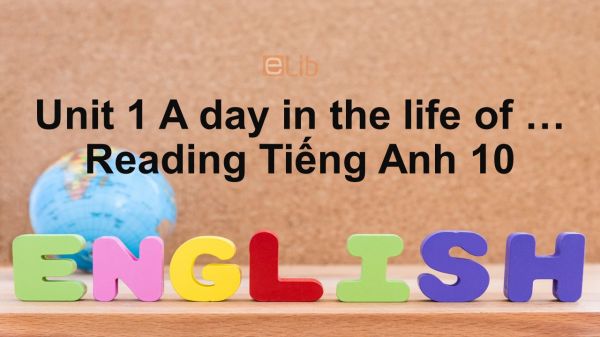Unit 1 lớp 10: A day in the life of ...-Reading
Bài học Unit 1 lớp 10 - A day in the life of ... phần Reading hướng dẫn các em một số kỹ năng đọc hiểu với nội dung bài đọc xoay quanh hoạt động trong cuộc sống đời thường. Với đề tài quen thuộc, hi vọng các em rèn luyện kỹ năng đọc của mình hiệu quả nhất.
Mục lục nội dung

1. Before You Read Unit 1 lớp 10
Work in pairs. Ask and answer questions about your daily routine, using the cues below (Làm việc theo cặp. Hỏi và trả lời các câu hỏi về những việc làm thường ngày của em, sử dụng gợi ý bên dưới)
Example: what time you often get up
A: What time do you often get up?
B: I often get up at six.
- what time you go to school/ have breakfast/ lunch/ dinner/ go to bed
- what you often do in the morning/ afternoon/ evening
Guide to answer
A: What time do you often go to school?
B: I often go to school at 6.30.
A: What time do you often have breakfast?
B: I often have breakfast at 6.
A: What do you often do in the morning?
B: I go to school.
A: What do you often do in the afternoon?
B: I often do my homework.
Bài dịch hội thoại
A: Bạn thường đến trường lúc mấy giờ?
B: Tôi thường đến trường lúc 6 giờ 30.
A: Bạn thường ăn sáng lúc mấy giờ?
B: Tôi ăn sáng lúc 6 giờ.
A: Bạn thường làm gì vào buổi sáng?
B: Tôi đến trường học
A: Bạn thường làm gì vào buổi chiều?
B: Tôi thường làm bài tập về nhà.
2. While You Read Unit 1 lớp 10
2.1. Task 1 Unit 1 lớp 10
Choose the option A, B, or C that best suits the meaning of the italicized word(s) (Chọn phương án A, B, hoặc C sao cho sát nghĩa với từ in nghiêng nhất)
1. The alarm goes off at 4:30. (Đồng hồ báo thức lúc 4 giờ 30.)
A. goes wrong B. goes away C. rings
2. It takes me 45 minutes to get ready. (Tôi mấy 45 phút để chuẩn bị.)
A. to go B. to wake up C. to prepare
3. We chat about our work. (Chúng tôi tán gẫu về công việc.)
A. talk in a friendly way B. learn C. discuss
4. We are contented with what we do. (Chúng tôi hài lòng về những gì mình đã làm.)
A. satisfied with B. disappointed with C. interested in
Guide to answer
1-C: go off = ring: báo hiệu, reo
2-C: to get ready = to prepare: chuẩn bị
3-A: chat = talk in a friendly way: tán gẫu, nói chuyện phím
4-A: contented with = satisfied with: hài lòng
2.2. Task 2 Unit 1 lớp 10
Answer the following questions (Trả lời các câu hỏi sau)
1. What is Mr. Vy's occupation? (Nghề nghiệp của ông Vy là gì?)
2. What time does he get up and what does he do after that? (Ông ấy thức dậy lúc mấy giờ và làm gì sau đó?)
3. What does he do in the morning? (Ông ấy làm gì vào buổi sáng?)
4. What do Mr. Vy and his wife do in the afternoon? (Ông Vy và vợ làm gì vào buổi chiều?)
5. Are they happy with their lives or not? Why? (Họ hạnh phúc hay không hạnh phúc với cuộc sống của mình không? Tại sao?)
Guide to answer
1. He's a peasant/ farmer. (Ông ấy là một người nông dân.)
2. He gets up at 4:30 and goes down to the kitchen to boil some water for his early tea. (Ông ấy thức dậy lúc 4 giờ 30 và bước xuống giường để đun nước chuẩn bị pha trà.)
3. He ploughs and harrows his plot of land, drinks tea and smokes local tobacco with his fellow peasants during his break. (Ông ấy đi cày, bừa mảnh ruộng, uống trà và hút thuốc với những ông bạn nông dân khác của mình suốt giờ nghỉ.)
4. In the afternoon, Mr. Vy and his wife repair the banks of their plot of land. Mr. Vy pumps water into while his wife does the transplanting. (Vào buổi chiều, ông Vy và vợ đắp bờ cho ruộng. Ông Vy bơm nước vào ruộng trong khi vợ ông cấy lúa.)
5. Yes, they are. Because they love working and they love their children, too. (Họ hạnh phúc với cuộc sống hiện tại. Bởi vì họ yêu công việc và con cái của mình.)
2.3. Task 3 Unit 1 lớp 10
Scan the passage and make a brief note about Mr. Vy and Mrs. Tuyet's daily routines. Then compare your note with a partner. (Đọc lướt đoạn văn và ghi chú vắn tắt về công việc thường làm hằng ngày của ông Vy và bà Tuyết. Sau đó so sánh bảng ghi chú của em với bạn cùng học.)
|
in the morning |
4:30: The alarm goes off and Mr. Vy gets up. ........................................ |
|
in the afternoon |
........................................ ........................................ |
|
after dinner |
........................................ ........................................ |
Guide to answer
|
in the morning |
goes down to the kitchen, boils water for tea, drinks tea, has a quick breakfast, leads the buffalo to the field.
ploughs, harrows the plot of land.
|
|
in the afternoon |
go to the field again, repair the banks of the plot of land. Mr Vy pumps water into the field, Mrs Tuyet does the transplanting.
|
|
after dinner |
and chat with them. |
3. After You Read Unit 1 lớp 10
Work in groups. Talk about Mr. Vy and Mrs. Tuyet's daily routines. (Làm việc theo nhóm. Hãy nói về công việc hàng ngày của ông Vy và bà Tuyết.)
Guide to answer
Mr Vy and Mrs Tuyet are farmers. They get up early, at 4:30 a.m. They work hard on their plot of land, usually from 5:30 a.m. till 6 p.m. Mr Vy usually takes an hour's rest after lunch.
After dinner, they watch TV and go to bed at about 10 p.m. Sometimes, they visit their neighbors and chat about their work, their children and their plan for the next crop. They love working and they love their children as well.
4. Practice
4.1. Reading comprehension
Read the following text and choose the best answer (Đọc bài văn dưới đây và chọn đáp án đúng nhất)
ROUTINES
Think about your daily life. Do you follow the same read :o work every day? Do you sit in the same place in class? When you get dressed, do you always put the same leg or arm in first? You probably do, because we all have routines in our lives.
Routines save time and energy because you do them without thinking, that's why they are so important in the morning when your brain isn't active. Here's Jo talking about her morning routine.
"Oh yes. I always do exactly the same things. 1 wake up at seven o'clock every morning, but I don't get quarter past seven. I switch on the radio and listen to the news. Then I go to the too and I brush my- teeth. I have a shower and dry my hair. Then I choose my clothes and I get dressed. I don't eat anything for breakfast. I just have a cup of coffee. Then I go to work. Yes, it's always the same."
Routines are very useful. but they also make you uncreative. So sometimes it's a good idea to break your routines. Get out of bed on the opposite side. Listen to a different radio station. Take a different route to work. Eat something different for breakfast. Change your routine. You never know, it could change your life.
1. This passage is mainly concerned with .................
a. our usual ways of doing things b. our daily activities
c. Jo's timetable d. changes in our lives
2. According to the passage, routines are useful because................
a. we can do them in the morning b. they make a habit of never thinking
c. they save time and energy d. we all have them in our lives
3. The word "loo" in line 9 can best be replaced with ................
a. balcony b. bedroom c. sink d. toilet
4. What is the main disadvantage of routines?
a. Routines make us unable to create things or to have new ideas.
b. Routines may change our life.
c. Routines make a habit of never thinking before doing.
d. Routines make us do the same things day after day.
5. Which of the sentences is true?
a. Routines make our brain creative.
b. People who have routines are unable to think.
c. We shouldn't break our routines.
d. Our lives could be changed if we change our routines.
4.2. Multiple-choice
Để nâng cao kĩ năng đọc hiểu về chủ đề "A day in the life of ...", mời các em đến với phần luyện tập trắc nghiệm Unit 1 Reading Tiếng Anh 10 sau đây.
5. Conclusion
Qua bài học này, các em cần ghi nhớ một số từ vựng quan trọng trong bài học như sau
- Daily routine (n): thói quen hằng ngày, công việc hằng ngày
- Bank (n) [bæηk] : bờ
- Boil (v) [bɔil]: luộc, đun sôi (nước)
- Plough (v) [plau]: cày (ruộng)
- Harrow (v) ['hærou]: bừa (ruộng)
- Plot of land (exp): thửa ruộng
- Fellow peasant (exp): bạn nông dân
- Pump (v) [pʌmp]: bơm (nước)
- Chat (v) [t∫æt] = talk in a friendly way: nói chuyện phím, tán gẫu
- Crop (n) [krɔp]: vụ, mùa
- Do the transplanting (exp) [træns'plɑ:ntin]: cấy (lúa)
- Be contented with (exp) [kən'tentid] = be satisfied with (exp) ['sætisfaid]: hài lòng
- Go off = ring (v): reo leo, reng len (chuông)
- Get ready [get 'redi] = prepare (v) [pri'peə]: chuẩn bị
- Be disappointed with (exp) [disə'pɔint]: thất vọng
- Take a short rest (exp): nghỉ ngơi ngắn (take-took-taken)
- Occupation (n) [,ɒkjʊ'pei∫n]= job (n) [dʒɔb]: nghề nghiệp, công việc
Tham khảo thêm
- doc Unit 1 lớp 10: A day in the life of ...-Speaking
- doc Unit 1 lớp 10: A day in the life of ...-Listening
- doc Unit 1 lớp 10: A day in the life of ...-Writing
- doc Unit 1 lớp 10: A day in the life of ...-Language Focus



